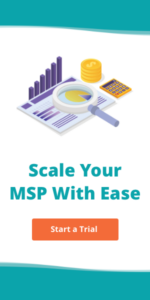Approximately 92% of companies in the U.S. have outsourced their IT services to varying extents. While this implies that there are plenty of opportunities for Managed Service Providers (MSPs), 44% of MSPs say that getting new clients will be their biggest challenge going forward. For these MSPs, potential clients get lost somewhere within the sales funnel. This is where MSP marketing comes in. What is MSP marketing? It is the process of promoting and convincing potential clients to take advantage of your managed IT services. And one of the MSP best practices is to fully understand the MSP sales funnel.
Acquiring a new client entails nurturing them from a potential lead to a loyal client through marketing. This is a five-step process referred to as a sales funnel. Here is a comprehensive breakdown of how an MSP sales funnel should work.
The Five Stages of an MSP Sales Funnel
Every company in every industry has a sales funnel. The standard sales funnel comprises four stages: awareness, interest, decision-making, and, finally, acting on the decision. However, an MSP sales funnel differs slightly from an ordinary one and involves five stages instead of four. Here is an overview of what it entails:
1. Lead Generation & Qualification
Lead generation is the starting point of your sales funnel. It entails promoting your MSP services to get the attention of potential clients – essentially, it entails creating awareness. It all comes down to your MSP marketing strategy and tactics.
Some of the most efficient digital marketing tactics to generate sales leads for your MSP include:
- Email marketing
- Social media marketing
- PPC (Google ad) advertising
- Content marketing
- Search Engine Optimization (SEO)
It is important to coordinate your different marketing tactics to work towards the same goal. Ultimately, you need a robust digital marketing system with access to a comprehensive technology marketing toolkit to reach out to your audience.
Unfortunately, only a fraction of the leads generated will become paying clients. As such, prospect qualification is an integral aspect of lead generation. This concept aims to focus on the leads that exhibit the greatest potential for becoming clients. The best way to qualify leads is by thoroughly analyzing their needs and other important factors such as their budget.
2. Trial

MSP services are not a one-size-fits-all package, as companies’ needs and preferences for IT management vary considerably. As such, a potential customer needs surety from you that you can deliver quality services according to their expectations. The best way to prove your competence is through real-time demonstration by offering your leads free trials on some or all of your managed services.
Offering a free trial is a necessary part of every MSP’s sales funnel. In most cases, it is the only way to showcase the quality of your services to the client – most clients will not enter into a contract without knowing what to expect.
Offering new leads free trials presents a great opportunity to market your MSP services – your marketing content can be more informative and less sales-oriented. Many people appreciate free gifts, and a free trial may be the last push that some of your leads need to sign up. It is a win-win solution for you and your clients.
3. MSP Sales Process Follow-Up
Ideally, your leads should sign up for your premium MSP services after their free trial ends. However, this isn’t always the case as some clients might not be fully satisfied with what you have to offer. In this case, it is advisable to follow up with these potential clients to give them the extra nudge they need to turn into paying clients. For example, you can ask them to sign up for your services after their free trial ends.
It is important to adopt a calculated approach when following up with your potential leads. Timing is especially important in the sales cycle – ideally, you should follow up with the leads while they are still hot before another MSP converts them. It is also advisable to use multiple communication channels, including:
- Telephone (for hot leads)
- Text messages
- Social media
Besides timing, it is also important to avoid being labeled as a nuisance for being too sales-oriented. Your potential clients will not sign up with you because you repeatedly asked them to do so. Instead, you should educate them about the benefits they stand to gain from your services and let them make an informed decision. Listen to their questions and concerns, as that could provide valuable insight into your sales process.
4. Conversion
Everything you have been doing up to this point has been aimed at converting your leads into loyal clients. However, you can always go one step further by engaging in direct conversion tactics. For example, you can use Calls-to-Action (CTAs) to prompt your leads to sign up for your services. You can also entice your leads by offering more free offers in addition to the initial free trial.
It is important to make it as easy as possible for your leads to sign up for your services. As such, the onboarding process should be quick and simplified – your clients shouldn’t have to jump through hoops to give you their business.
5. Contract
The final phase entails signing up the potential leads as clients. Once again, everything you have done up to this point was geared towards making this a success. Ideally, you should have varying options to suit your clients’ varying needs and preferences.
How Do You Market MSP Services?
Understanding the MSP sales funnel will help you develop an efficient marketing strategy. As explained, the initial phase of your msp marketing plan entails generating and qualifying leads, as covered in detail above. Now, supposing that you have generated and qualified potential leads, what should you do next?
Drafting a Proposal
Your potential leads want to know what you can offer them before signing up for your MSP platform and services. You can let them know through a detailed proposal.
Each proposal should be personalized to suit the client’s unique needs and preferences. As such, it is important to research and understand each client’s needs and base your proposal on this data. Focus on the nature of the client’s IT needs (for example, do they deal with sensitive data requiring advanced cyber-security, or are they looking for routine IT management services?) and their budget.
Your proposal shouldn’t be sales-oriented. Instead, it should:
- Offer a quick overview of your different packages and the services under each package.
- Give detailed, easy-to-read explanation of what each service entails.
- Explain your services’ value to the potential client’s business.
- Offer detailed insights into how you plan to implement the client’s IT services to their satisfaction.
- Include updated prices for each package and service.
Ultimately, the potential client should know exactly what to expect from you if they decide to sign up. Your clients will take some time to study your proposal before giving you feedback. However, some potential clients may still need more convincing to close the sale, so it is advisable to follow up with non-responsive leads after at least 24 hours.
Managing Rejections
Unfortunately, you cannot satisfy all of your potential clients’ needs. As such, rejections are common, and they may exceed approvals. Some of the leads may not be willing to come to a compromise, and there’s not much you can do about that. However, you can turn some of the rejections around by adjusting your offers to meet the potential clients’ needs.
Managing rejections can be a delicate affair. The best way to approach it is by studying and analyzing each rejection to understand the potential client’s reasons behind their decision. This will enable you to develop a compelling counter-offer.
Conclusion
Syncro makes it easy to market your MSP business with our comprehensive remote monitoring and management (RMM) and professional services automation (PSA) solutions. Start a free trial today to see how we can help you grow your client base as well as monthly recurring revenue.
Share













